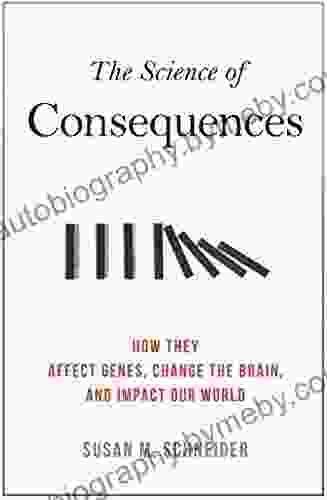Unveiling the Enigmatic Realm of Epigenetics: How They Affect Genes, Change the Brain, and Impact Our World

Prologue: A Paradigm Shift in the Understanding of Genetics
For centuries, the dogma of genetics held sway: our DNA, an immutable blueprint inherited from our parents, dictates our destiny. However, the advent of epigenetics has shattered this simplistic view, revealing a dynamic interplay between genes and the environment, where external influences can profoundly alter gene expression without changing the underlying DNA sequence.
4.8 out of 5
| Language | : | English |
| File size | : | 3660 KB |
| Text-to-Speech | : | Enabled |
| Screen Reader | : | Supported |
| Enhanced typesetting | : | Enabled |
| Word Wise | : | Enabled |
| Print length | : | 386 pages |
Epigenetics, meaning "above the genome," refers to heritable changes in gene expression that do not involve alterations in the DNA itself. These changes, often triggered by environmental cues, can be short-lived or persist across generations, shaping our physical and mental traits in ways we are only beginning to understand.
Epigenetics and Gene Expression
One of the primary mechanisms of epigenetic regulation is DNA methylation, a chemical modification that adds a methyl group to specific DNA regions. This modification can either suppress or enhance gene expression, depending on the location and context of the methylation.
Another key epigenetic mechanism is histone modification. Histones are proteins that package DNA into chromatin, the compact form of DNA found in cells. Modifications to histones, such as acetylation and methylation, can alter chromatin structure, making genes more or less accessible to the cellular machinery that reads and transcribes them.
Epigenetic Influences on Brain Development and Mental Health
Epigenetics plays a crucial role in brain development and function. Environmental factors, such as prenatal stress and early childhood experiences, can induce epigenetic changes that have lasting effects on brain structure, connectivity, and neurochemical balance.
These epigenetic modifications can increase or decrease the risk of developing mental health disFree Downloads such as anxiety, depression, and schizophrenia. For example, studies have shown that childhood trauma can lead to epigenetic changes in genes involved in stress response and emotional regulation, increasing the likelihood of developing psychiatric disFree Downloads in later life.
Epigenetics and Chronic Diseases
Epigenetics also has far-reaching implications for chronic diseases, including cardiovascular disease, cancer, and diabetes. Environmental factors, such as diet, exercise, and exposure to toxins, can induce epigenetic changes that alter gene expression and increase the risk of developing these diseases.
For instance, a high-fat diet has been shown to promote epigenetic modifications that increase the risk of obesity and related metabolic disFree Downloads. Similarly, exposure to air pollution can lead to epigenetic changes in genes involved in inflammation and lung development, increasing the risk of respiratory diseases.
Epigenetics and Social Inequality
Emerging research suggests that epigenetic changes can be transmitted across generations, potentially perpetuating health and socioeconomic disparities. Adverse experiences, such as poverty, discrimination, and lack of access to quality healthcare, can induce epigenetic modifications that increase the risk of developing chronic diseases and mental health disFree Downloads in subsequent generations.
This intergenerational transmission of epigenetic changes raises profound concerns about the long-term consequences of social inequality. Understanding these mechanisms is crucial for developing interventions aimed at breaking the cycle of disadvantage and promoting health equity.
The Promise of Personalized Medicine
Epigenetics holds immense promise for personalized medicine, tailoring treatments to individual genetic and epigenetic profiles. By understanding how environmental factors influence gene expression, healthcare professionals can design treatments that target the specific epigenetic changes associated with a particular disease or condition.
For example, epigenetic drugs that reverse DNA methylation or histone modifications could be used to treat mental health disFree Downloads or chronic diseases with an epigenetic component. Personalized epigenetic therapies have the potential to improve treatment outcomes and reduce the risk of adverse side effects.
: A New Frontier in Science
Epigenetics is a rapidly evolving field that is transforming our understanding of gene regulation, health, and human development. By uncovering the intricate mechanisms by which environmental factors shape our genes, we gain unprecedented insights into the causes of disease, the complexities of mental health, and the profound impact of social factors on our well-being.
As research continues, we can anticipate further groundbreaking discoveries that will deepen our understanding of the epigenetic landscape and its implications for human health and society. Epigenetics is not merely a scientific discipline; it is a new frontier that holds the potential to reshape our understanding of ourselves and our world.
4.8 out of 5
| Language | : | English |
| File size | : | 3660 KB |
| Text-to-Speech | : | Enabled |
| Screen Reader | : | Supported |
| Enhanced typesetting | : | Enabled |
| Word Wise | : | Enabled |
| Print length | : | 386 pages |
Do you want to contribute by writing guest posts on this blog?
Please contact us and send us a resume of previous articles that you have written.
 Book
Book Novel
Novel Page
Page Chapter
Chapter Text
Text Story
Story Genre
Genre Reader
Reader Library
Library Paperback
Paperback E-book
E-book Magazine
Magazine Newspaper
Newspaper Paragraph
Paragraph Sentence
Sentence Bookmark
Bookmark Shelf
Shelf Glossary
Glossary Bibliography
Bibliography Foreword
Foreword Preface
Preface Synopsis
Synopsis Annotation
Annotation Footnote
Footnote Manuscript
Manuscript Scroll
Scroll Codex
Codex Tome
Tome Bestseller
Bestseller Classics
Classics Library card
Library card Narrative
Narrative Biography
Biography Autobiography
Autobiography Memoir
Memoir Reference
Reference Encyclopedia
Encyclopedia Hannah Lucinda Smith
Hannah Lucinda Smith Andrew Sutton
Andrew Sutton Prenisha Aja
Prenisha Aja John Martin Taylor
John Martin Taylor Greg Jenkins
Greg Jenkins Amy Wilentz
Amy Wilentz Andrew Bryant
Andrew Bryant Todd R Tresidder
Todd R Tresidder Maura Weis
Maura Weis Angeline Trevena
Angeline Trevena Michael Bateman
Michael Bateman Amy Cuddy
Amy Cuddy Andrea Wulf
Andrea Wulf Anil Ananthaswamy
Anil Ananthaswamy Anlor Davin
Anlor Davin Heather Ayris Burnell
Heather Ayris Burnell John Schlue
John Schlue Angela Rizza
Angela Rizza Marki Lemons Ryhal
Marki Lemons Ryhal G Roebuck
G Roebuck
Light bulbAdvertise smarter! Our strategic ad space ensures maximum exposure. Reserve your spot today!

 Yasushi InoueKey Concepts in Politics and International Relations: A Comprehensive Guide...
Yasushi InoueKey Concepts in Politics and International Relations: A Comprehensive Guide... Chuck MitchellFollow ·4.3k
Chuck MitchellFollow ·4.3k Hugh BellFollow ·12.1k
Hugh BellFollow ·12.1k Roland HayesFollow ·2.7k
Roland HayesFollow ·2.7k Charles BukowskiFollow ·10k
Charles BukowskiFollow ·10k Devin CoxFollow ·7.4k
Devin CoxFollow ·7.4k Jake PowellFollow ·19.8k
Jake PowellFollow ·19.8k Kurt VonnegutFollow ·14.2k
Kurt VonnegutFollow ·14.2k Anthony WellsFollow ·12.3k
Anthony WellsFollow ·12.3k

 Bryce Foster
Bryce FosterCelebrate the Luck of the Irish: Unveiling Saint...
As the verdant hues of spring brush...

 Chase Simmons
Chase SimmonsCody Rodeo: A Photographic Journey into the Heart of the...
Step into the arena of the...

 David Mitchell
David MitchellUnveiling the Enchanting World of Door County Quilts: A...
Step into the Heart of Amish Country in...

 Floyd Powell
Floyd PowellCowboy Chatter: Unraveling the Enigmatic Tales of the Old...
Step into the...

 Ismael Hayes
Ismael HayesUnlock Content Marketing Mastery: How to Create...
In today's digital landscape, content is...

 Boris Pasternak
Boris PasternakMore Than 200 Hardball Questions For The Thinking Fan
The Ultimate Baseball Trivia Challenge Are...
4.8 out of 5
| Language | : | English |
| File size | : | 3660 KB |
| Text-to-Speech | : | Enabled |
| Screen Reader | : | Supported |
| Enhanced typesetting | : | Enabled |
| Word Wise | : | Enabled |
| Print length | : | 386 pages |










